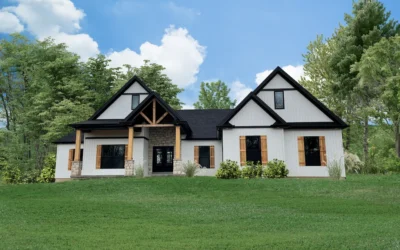At CMS Homes and Guild Mortgage, we hear this question frequently, “Should I buy a new home while interest rates are still going up?” The answer depends on your exact situation, but overall, a home is an investment that can typically provide equity and the future stability that renting or staying in a declining market will not provide. Is it the right time for you? Keep reading for information that will help you decide.
Some Advice for Getting a Mortgage in 2023–2024
Rising interest rates have stopped many would-be home buyers in their tracks. But even at the current 7–7.6% interest rates, houses are still in short supply in the St. Charles County and Lincoln County areas. Bidding wars continue in many towns and cities in our area, leaving people who want to stop renting or need more space without many options. So, what do you do?
If you want to buy a house, waiting for interest rates and home prices to drop won’t help — the consensus is that interest rates won’t come down significantly for a long time, and if they do, it’s unlikely we’ll ever see 2–3% again. Even if they fall slightly, say from 7.5 to 7.25%, this is approximately a $50–60 per month difference on a $300,000 home over 30 years. Plus, when rates drop, demand goes up even more, making it increasingly difficult to get the home you want within budget.
Tony Pogrelis, Branch Manager at Guild Mortgage, says, “You have to go into the market being okay with where interest rates are right now and what your house payment will be for the next 20 or 30 years. Don’t buy a house assuming you’ll refinance if rates come down. Rates may not come down for a long time and refinancing doesn’t make sense for every situation.”
To get you on track to buy or build a house, this blog answers a couple of the most frequently asked questions, provides a few strategies to navigate this unpredictable interest rate market, and how to weigh what buying now means for your future.

FAQs for Today’s Mortgage Interest Rate Discussion
What Determines Your Mortgage Interest Rate?
What determines your mortgage interest rate? There are many factors, including your credit score, debt-to-income ratio, employment history, adequate proof of funds, the size and term of the loan, and the loan type. Other dynamics include macroeconomics, such as the area where you are buying or building, house prices in that area, and demand. The lending company you choose and its flexibility with interest rates can also play a role.
Is it Harder to Qualify With Higher Interest Rates?
It can be harder to qualify now for the same mortgage that you were qualified for last year due to higher interest rates, simply because your monthly payment will also be higher. You will need more savings, the ability to make a larger down payment, or the ability to earn more money than last year to make the qualification process easier.
Now let’s talk about strategy. How do you get the right house for your budget without over-extending yourself?
Understand How Much House You Can Afford Before You Shop
One of the biggest mistakes buyers make is that they shop online, or start visiting homes with a realtor, fall in love with a home or two, and then start the financing process. It can be problematic for a mortgage broker to tell you the home on which you made an offer or fell in love is out of your financial reach.
Pogrelis explains, “I see this every day. Home buyers are notorious for assuming they can afford about 30% more home than they can actually afford. Now, with interest rates being more than double what they were at the beginning of 2022, it’s critical to get a handle on the top end of your mortgage budget. You’ll also want to go through some of the underwriting process before you shop to ensure there are no surprises like a low credit score or a higher income-to-debt ratio than assumed. These factors can raise your interest rate.
“With homes in the greater St. Charles and Lincoln County areas coming under contract within days of being listed, you want to walk into every home you tour or builder meetings with documentation of your pre-approved mortgage. It provides for a much stronger offer and the likelihood that your offer will be accepted over another. If you choose to build, presenting documentation from underwriting will make your home-build experience faster and easier.”
Pogrelis adds, “When you finance your build with Guild Mortgage, we underwrite and finalize the mortgage prior to construction starting, so there are no delays throughout the process, and payments don’t start until after you close on the property. It’s a win-win for everyone.”

Build a New Construction Home
When interest rates fluctuate, building a new construction home can work to your advantage for many reasons. You can:
- Utilize an extended interest rate lock.
- Forgo the construction loan when you build a CMS Home by using the CMS Homes Easy Build Program.
- Customize your house with exactly what you need and eliminate what you don’t to keep it within budget.
1. Secure an Extended Rate Lock
An extended interest rate lock is a smart solution for a new construction home that has a future completion date. Most lenders offer this and usually charge a fee to lock in your rate. Guild Mortgage, for example, offers a Builder’s Lock, which typically carries a .5 to .75% higher interest rate, but it locks that interest rate for up to a year, providing peace of mind and a huge benefit if interest rates continue to climb.
Additionally, if you were to lock in a 30-year fixed mortgage rate on September 30, 2023, your home is scheduled to be finished March 1, 2024, and then interest rates fall, your lender may be able to lower the rate to whatever the going rate is in late January or early February 2024. Pogrelis explains, “We call this a one-time loan float down. When your home is within 30 days of completion, if rates are lower than when you locked in your initial rate, we will adjust your rate accordingly.”
2. Avoid the Standard Construction Loan
Standard construction loans have much higher interest rates than a 30-year mortgage rate (up to 10%). These loans often complicate the transaction to the point where many people simply avoid building a new home because of the complexity of the short-term construction loan and long-term, 30-year fixed mortgage process.
If you’re interested in building a new home in the Saint Charles County or Lincoln County areas of Missouri, CMS Homes does not require a construction loan. In fact, if you plan to build with CMS Homes, please DO NOT get a construction loan. We offer our proprietary Easy Build Program where building your dream home is just like buying a move-in-ready home — one mortgage at the time of closing.
3. Customize Your New Construction Home to Keep it Within Budget
Before you start the home-building process, meet with a reputable lender who can provide an exact budget. Once you have this information and you sit down with a builder, it is much easier to customize existing home plans with what your family needs for function, comfort, and style, and eliminate the extras that you don’t need to stay on budget.
For example, CMS Homes offers dozens of existing home plans that come with a selection of exterior and interior features included in the price. However, if there is a feature like landscaping or stone on the façade that isn’t imperative, and the cost equivalent is $5000, you can either eliminate it or use part of that $5000 toward a feature you do need or want. This is a perk that you do not have with already built and lived-in houses. Not all building companies offer this flexibility, so be sure to ask when meeting with them to determine the costs involved in making changes.

Use a Local Mortgage Broker
No matter what the housing market looks like — fluctuating interest rates, low supply, high demand, general uncertainty — using a local mortgage broker has many advantages. Many home buyers start the pre-approval process with an online chain because it’s easy to get a pre-approval letter by typing in a few bits of information. Then they move through the process with that company because they’ve already started the process. However, buyers frequently find out halfway through the mortgage process that there’s a problem and they’re not going to close on time or even worse, close at all.
 “We see this way too often. People come to Guild Mortgage after they’ve waited weeks and sometimes months for one portion of the mortgage process to finalize. They can’t reach a person who can help or the person on the other end of the phone or chatbot tells them what they want to hear but nothing moves forward,” Pogrelis says. “Working with an experienced professional in your community who gets to know you and works closely with you throughout such a life-changing experience is imperative to a carefree, timely, and cost-effective buying process. Problems can be addressed immediately, you have an advocate who can move the process along without involving you unless it’s necessary, and you develop a relationship that can benefit you long-term.”
“We see this way too often. People come to Guild Mortgage after they’ve waited weeks and sometimes months for one portion of the mortgage process to finalize. They can’t reach a person who can help or the person on the other end of the phone or chatbot tells them what they want to hear but nothing moves forward,” Pogrelis says. “Working with an experienced professional in your community who gets to know you and works closely with you throughout such a life-changing experience is imperative to a carefree, timely, and cost-effective buying process. Problems can be addressed immediately, you have an advocate who can move the process along without involving you unless it’s necessary, and you develop a relationship that can benefit you long-term.”
Advantages of a Local Mortgage Broker
- Obtain a reliable mortgage pre-approval with proof of qualified funds to make an offer on a home without worry that it will fall through.
- Have a better chance of your offer being accepted when compared to other buyers.
- Be a prime candidate with a building company based on your choice of lender (reputable, easy-to-work-with wins!).
- Work with a local person who is held accountable for your information and the entire mortgage deal, from start to finish.
- Learn about multiple mortgage options customized to your financial situation and how to budget for long-term success.
- Lock in a realistic interest rate that won’t change unless it benefits you.
- Get to the closing table on time and within budget with proactive troubleshooting, extensive knowledge, and advice from your broker.
- Know exactly which company “owns” your mortgage without having to deal with an unknown company down the line (if your lender services the loan and doesn’t sell it).
- Enjoy the peace of mind that comes from dealing with a real person who cares about you and your goals and is there for your future financial needs.
Is Buying a Home in 2023–2024 A Smart Move?
Great question! You are not alone in this inquiry. It can be a tough decision, but meeting with a mortgage broker to create a plan is the easiest way to make this decision. There are too many variables to consider, and the answer to this question is entirely dependent on your unique situation.
A few things to think about:
Paying $1500 to 2500 a month in rent? Does it make sense to have that money become an investment in your future rather than throwing it away on nothing? Find out if you are ready to do this now, and if not, make a plan for your future.
If you’re waiting for rates or home prices to come down, as many people did last year and now they’re paying more, it’s a good idea to meet with a local lender to learn about your mortgage options so you can get the best rate now or in the near future.
There are mortgage customizations that can be made based on countless factors (potentially no PMI, buying points, etc.). You may get a better interest rate than you presume, or you’ll walk away with a solid plan on how to save or improve your credit score to get the best interest rate down the road.
How long do you plan to own the house? Do you have a job that transfers you every few years or are you hoping to live there for 20 to 30 years? This helps determine your break-even point between the higher interest rates, down payment, and closing costs versus having to sell in a year or two and potentially lose a significant amount of capital.
If you overextend on your mortgage payment now hoping to refinance at a soon-to-be-lower interest rate, you could be waiting a long time. This could result in having to sell your home too soon, a potential losing proposition in an uncertain marketplace. Also, you’ll incur additional costs to refinance – up to 1 to 1.5% of the new loan amount. On a $400,000 home, that’s around $6000 that you will likely not get back if you’re forced to sell before you’ve broken even on those refinancing closing costs.
Buying a home now is not a bad idea — we’re simply in a different market landscape than a year ago, one that will be the “new normal;” a market that requires solid evaluation and a realistic approach.

Contact CMS Homes or Tony Pogrelis Today to Get Started
We are grateful you’re considering a CMS Home and thrilled to help you take the right steps to get pre-approved so you have the best chance of investing in your dream home without the stress of paying more than you can afford.
In this higher interest rate market, buying or building your next home with the exact right financial terms for you comes down to working with a reputable, caring mortgage broker who works hard to get you the best terms, and partnering with CMS Homes for a carefree home buying and building experience. Want to learn more? Contact CMS Sales or Tony Pogrelis with Guild Mortgage today for a no-obligation conversation about your first or next home investment.




0 Comments